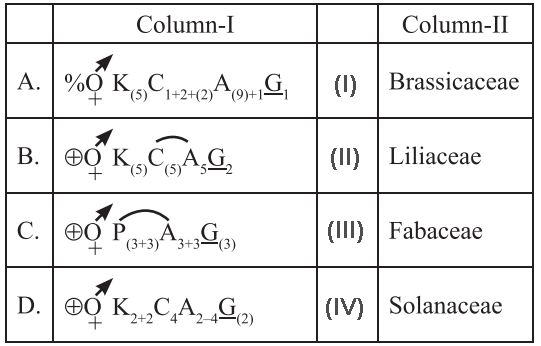
This Page Score: 0/40
Inspite of interspecific competition in nature, which mechanism the competing species might have evolved for their survival?
Amensalism can be represented as:
The amount of nutrients, such as carbon, nitrogen, phosphorus and calcium present in the soil at any given time, is referred as:
Which of the following statements is not correct?
In the equation GPP–R = NPP.
R represents:
Which of the following statements is correct?
Match Column-I with Column-II.
Choose the correct answer from the options given below:

Select the correct pair.
| Large colorless empty cells in the epidermis of grass leaves | - Subsidiary cells |
| In dicot leaves, vascular bundles are surrounded by large thick-walled cells | - Conjunctive tissue |
| Cells of medullary rays that form part of cambial ring | - Interfascicular cambium |
| Loose parenchyma cells rupturing the epidermis and forming a lensshaped opening in bark | - Spongy parenchyma |
| Cells of medullary rays that form part of cambial ring | Interfascicular cambium |
Match List-I with List-II.
| List-I | List-II |
|---|---|
| (A)Protein | (I)C = C double bonds |
| (B)Unsaturated fatty acid | (II)Phosphodiester bonds |
| (C)Nucleic acid | (III)Glycosidic bonds |
| (D)Polysaccharide | (IV)Peptide bonds |
Match List-I with List-II.
| List-I | List-II |
|---|---|
| (A)S phase | (I)protein are synthesized |
| (B)G2 phase | (II)Inactive phase |
| (C)Quiescent stage | (III)Interval between mitosis and initiation of DNA replication |
| (D)G1 phase | (IV)DNA replication |
This Page Score: 0/40